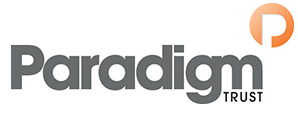Inclusive Learning – Giving every child their chance
Inclusive learning is supporting the needs of every pupil in order to give them the same opportunities as their peers. It’s about equity, giving the child the right tools to be able to learn, whether that’s within a mainstream or a specialist setting.
To ensure effective inclusive learning takes place in its schools, Paradigm focuses on the individual needs of every child. By giving appropriate support to pupils who may not be able to learn in the same manner as their peers, the Trust makes sure that all children can have the same opportunities.

Paradigm approaches inclusive learning with a holistic approach; in addition to considering the academic aspect, other factors such as independence, resilience and attention skills are also looked at and worked on where necessary. Where integration is the best option then Paradigm will work to provide this, but in some cases integration can actually be a barrier to learning. For instance, deaf students engaging in shared reading may be better off away from the main class in a space that is acoustically suitable, enabling them to access the work in a more helpful environment.
While inclusive learning support is often associated purely with special educational needs, the Trust understands barriers to learning can be caused by other factors too, such as social, gender and economic issues. These aspects are all considered when assessing how to implement inclusive learning that best suits the child.
Paradigm Trust invests heavily to improve further its ability to implement effective inclusive learning. At Culloden Primary Academy in London it has an established Deaf Support Base to help children with hearing impairment, and in 2020 specialist units were opened at Murrayfield Primary and Piper’s Vale Primary in Ipswich. These are designed for children with a range of needs, including autism and/or sensory processing challenges and provide an environment which is beneficial for their learning. Working in conjunction with Suffolk County Council, Paradigm Trust is also working to establish a new special school for pupils with additional needs in Suffolk, and it hopes to welcome the first intake in 2022/23.
Where schools require specialist services that are not available inhouse, expert external providers are brought in to help pupils. These include speech and language therapists, educational psychologists and occupational therapists. Independent learners are also supported by the Trust with a range of strategies and teaching aids, including task planners, visuals and visual aids, interventions and learning mentors.

As inclusive learning at Paradigm is focused on the individual needs of each child, effective assessment must be made to enable the correct support to be put into place. The main assessments take place in the summer term, so plans can be in place for the start of the academic year in September. However, each child’s progress is monitored throughout the year and if at any time it becomes apparent that additional or alternative measures would be beneficial, then this is discussed with pupils, their parent/carer and the relevant members of staff.
Covid 19 has required considerable work to ensure all children continue to receive the same learning opportunities despite the disruption. One major challenge was the ‘digital divide’ over the two periods of remote learning; many children, both at Paradigm and nationally, were unable to access online learning due to a lack of devices or insufficient broadband access. To help bridge this gap Paradigm supplied over 2,100 Chromebooks to its children, plus hundreds of dongles which were preloaded with data allowance. Later, when children returned to schools and the wearing of masks was mandatory for teaching staff, the Trust ensured there were transparent masks available, where required, so deaf children weren’t disadvantaged by being unable to see the mouths of the teachers.
Working collaboratively across the Trust’s six schools is a key factor in delivering inclusive learning effectively. By pooling resources, teachers across the Trust are able to access expertise which would be beneficial in their school, but is not something they personally have. One way in which this happens is through a SENCO Network group which meets regularly. This allows the SENCOs from each school to come together to support each other, discuss best practice and share their knowledge. In turn this benefits the children at every school. As an example, as Culloden Primary Academy has a Deaf Support base, staffed by qualified teachers of the deaf, they are able to provide specialist advice and support to teaching staff at other Paradigm schools where there are pupils with hearing impairment.
Of course, none of this can be effective without having the right people to plan and implement inclusive learning. Having the right fit is key, so when recruiting, Paradigm Trust always measures candidates on their passion for inclusion and their understanding of its importance. As a Trust, Paradigm has three lead values, two of which feed directly into inclusive learning: Community – working together; learning from, and supporting, others; and Excellence – enabling everyone to achieve more through education. By staying true to these values, it can ensure all its pupils have access to the opportunities they need to learn and grow.
